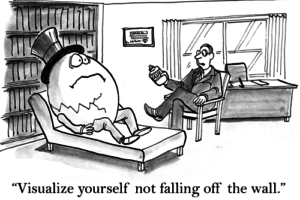 How can anyone not love magnets? They’re about as close as we can get to magic, with their ability to move things around invisibly and defy gravity by picking up nails right off the floor. And how about the North Pole, which manages to make a tiny compass needle thousands of miles away point toward it?
How can anyone not love magnets? They’re about as close as we can get to magic, with their ability to move things around invisibly and defy gravity by picking up nails right off the floor. And how about the North Pole, which manages to make a tiny compass needle thousands of miles away point toward it?
Physicists long ago determined that electromagnetism—which is responsible for interactions between charged particles—is one of the key forces in the universe. Now neuroscientists are expanding our knowledge of the effects of magnetism on humans and how its manipulation can diagnose mental disorders and alter the ways we think and behave.
TMS: A Magnetism Sharp Shooter
Magnets and the brain are well acquainted. We’re all familiar with MRIs, which use magnetic fields and radio waves to produce colorful galleries of brain images, as well as other organs and structures in our bodies. But MRIs are used for diagnostic purposes. A technology known as transcranial magnetic stimulation (TMS) can therapeutically alter activity in the brain by creating a magnetic field that produces a mild electrical current in the targeted brain region. Small amounts of electricity are naturally generated by neuronal connections, so any new electrical input can change these connections.
Scientists are learning how to aim TMS more efficiently, which allows them to discover more about the functioning of specific areas of the brain and how to improve it. By zeroing in on areas involved in mood regulation, for example, TMS has been effective in reducing symptoms of depression. Because TMS can limit exposure to a specific region, it tends to have fewer side effects than therapies such as electroconvulsive therapy, which affects a wider area of the brain. Ongoing TMS research is yielding new insights on the most advanced cognitive functions, including consciousness, impulse control, and working memory.
Especially exciting is the potential of TMS to stimulate individual neurons. In experiments conducted by John T. Gale, Ph.D., a neurobiologist at the Cleveland Clinic, and Giorgio Bonmassar, Ph.D., a physicist at Harvard Medical School, that were reported in Nature Communications, individual rabbit retina neurons were made to fire by placing an energized micro-magnet near them. By allowing such selectivity, TMS could eventually be used to correct malfunctions in very small areas of the brain.
Magnetism Can Alter Our Ethical Position
Studies show that a specific part of the brain called the right temporo-parietal junction (RTPJ) has heightened activity when we make moral judgments, such as evaluating a person’s intention. Investigators at MIT probed whether magnetism aimed at the RTPJ could affect this judgment. Test subjects were asked questions requiring a moral stance, such as whether it is ethical for a man to allow his girlfriend to cross a bridge that he knows is unsafe, even if she makes the crossing without incident. A control group said this was morally unacceptable, regardless of whether the crossing was a success. But in a test group who received a fast magnetic pulse to the RTPJ, the subjects based their opinion only on whether the woman crossed safely (“no harm, no foul”). Responses to other morally based questions further demonstrated that subjects were incapable of making a moral judgment while being “magnetized.”

The effects of magnets on cognitive processes have to make us wonder about how the earth’s natural electromagnetic field affects our thinking and emotions. Could a change in this field alter opinions and moods on a global scale? And can we change our own electromagnetic fields?
Organizations such as the Institute of HeartMath (IHM) are conducting extensive research into these possibilities. They have already shown that our hearts generate a powerful electromagnetic field of their own. “The heart generates the largest electromagnetic field in the body,” wrote Rollin McCraty, Ph.D., director of research at IHM, in a clinical paper entitled “The Energetic Heart.” “The electrical field as measured in an electrocardiogram (ECG) is about 60 times greater in amplitude than the brain waves recorded in an electroencephalogram (EEG).”
What remains to be seen is whether human electromagnetic fields can affect the global one. The IHM is exploring this possibility in their Global Coherence Initiative (GCI), launched in 2008. The GCI, with an international membership of close to 60,000, uses advanced sensing technology to detect whether humans radiating positive emotions en masse can change the earth’s magnetic field.
Imagine a world where magnetic energy has the power to make the world a happier place. Let’s hope the IHM shows it’s possible.
Related Reading




2 Comments
Richard R. Valentin
We have a friend who has cancer, it has cleared
up in every part of her body but the brain.
Can magnets be use therapeutically on the brain. Can magnets therapeutically cross the blood brain barrier? Have tumors ever been resuced by the use of magnets?
Victoria Rotante
Hi Richard,
Thank you for comments.
We certainly hope your friend continues her path to health. We wish her well!!
Unfortunately, do not know the answer to your questions, and must defer to a professional on this matter.
Best regards for a happy holiday season.